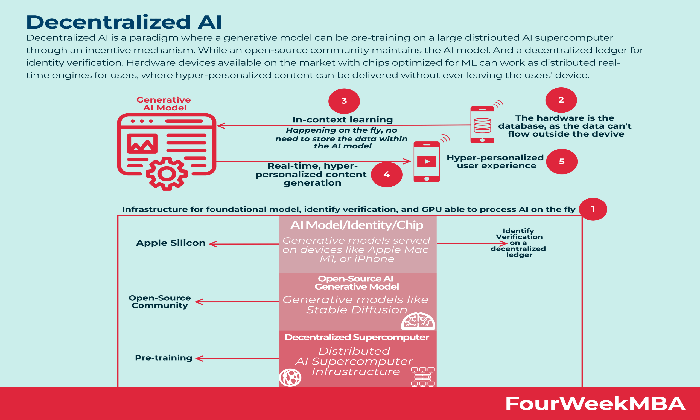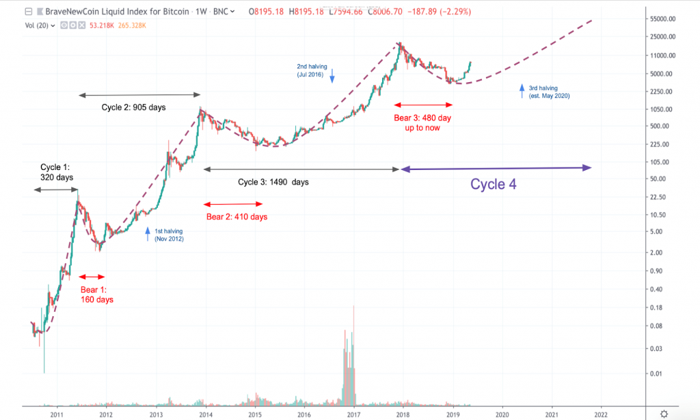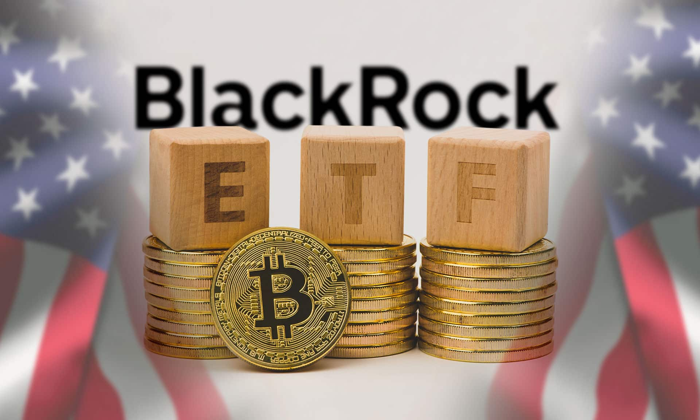Decentralized AI is rapidly emerging as a transformative force in the tech landscape, attracting significant venture capital investments, with $917 million raised so far. This convergence of AI and cryptocurrency leverages blockchain technology to challenge the traditional data dominance of major corporations like Alphabet and Amazon. As decentralized applications proliferate, they are starting to reshape the future of AI by granting users control over their data and privacy. Venture capitalists are taking note of this ecosystem’s potential, investing heavily in innovative projects that promise to mitigate issues such as spam and data scraping, while creating new financial opportunities. As interest in decentralized AI grows, its impact on the financial sector and beyond could redefine how we interact with technology and data ownership in the years to come.
The realm of distributed artificial intelligence represents a breaking point in how we envision data and autonomy in technology. As investment in systems that blend machine learning with blockchain rises, the landscape of software is becoming increasingly democratized and user-centric. Such initiatives aim to enable decentralized solutions that directly confront the monopolization trends seen with traditional tech giants. Alongside, the synergy of intelligent algorithms with secure decentralized networks is reshaping the narrative around data integrity and ownership. This paradigm shift is not simply a technological evolution but a movement toward a more equitable digital future, where users reclaim control over their interactions and contributions.
The Intersection of AI and Blockchain Technology
The intersection of Artificial Intelligence (AI) and blockchain technology is revolutionizing the digital landscape. As the demand for secure, efficient, and decentralized applications rises, investors are increasingly drawn to opportunities at this unique convergence point. Companies like Theta Capital emphasize that the integration of AI within blockchain frameworks not only enhances data security but also promotes transparency and trust. This push towards decentralized applications aligns with the growing need to address data ownership concerns and mitigate the risks associated with centralized operations.
AI systems, when embedded in blockchain networks, benefit from the unparalleled integrity and accessibility provided by distributed ledger technology. These solutions enable a new paradigm where decentralized AI tools can operate without the constraints imposed by traditional tech giants. Such innovative ventures focus on utilizing blockchain’s decentralized nature to democratize AI resources, thereby opening up new avenues for investment and development across various sectors. Venture capitalists view this synergy as a fertile ground for future opportunities, with expectations that it could dictate market dynamics in the years to come.
Frequently Asked Questions
What is Decentralized AI and how does it relate to blockchain technology?
Decentralized AI refers to artificial intelligence systems built on blockchain technology that allow for distributed data ownership and access. This integration aims to challenge centralized systems controlled by major tech companies, providing a more democratic approach to data utilization in AI.
How is venture capital investing in Decentralized AI shaping the future of AI?
Venture capitalists are significantly investing in Decentralized AI, with over $917 million funneled into this space, reflecting its potential as a transformative investment opportunity. This trend highlights the belief that the intersection of AI and blockchain could revolutionize data ownership and financial markets.
What role do decentralized applications play in the development of Decentralized AI?
Decentralized applications (dApps) serve as crucial platforms for Decentralized AI, enabling individuals to interact with AI models directly without the need for intermediaries. This fosters transparency and enhances user control over their data and AI-derived insights.
How can Decentralized AI help mitigate issues like spam and data scraping?
Decentralized AI can address spam and data scraping by utilizing blockchain mechanisms, such as micropayments, to disincentivize spam behaviors. This innovative approach makes it costly to send unwanted content while remaining affordable for genuine users.
Why are VCs interested in the intersection of AI and cryptocurrency?
Venture capitalists view the intersection of AI and cryptocurrency as a significant investment opportunity due to its potential to create decentralized alternatives to traditional AI systems. They believe this combination can enhance efficiencies, drive innovation, and disrupt the centralized tech landscape.
What is the significance of decentralized token networks in Decentralized AI?
Decentralized token networks are essential for building the infrastructure required for Decentralized AI. They enable participation from autonomous agents in financial markets, allowing for the sharing of data, computing power, and energy among decentralized nodes.
How might the future of AI be affected by decentralized finance (DeFi)?
The future of AI could be significantly influenced by decentralized finance (DeFi) through the creation of new financial models that reward users for sharing their data and computing resources. This could lead to a more balanced ecosystem where AI services are more accessible and equitable.
What challenges does Decentralized AI face in terms of widespread adoption?
Decentralized AI faces challenges such as ensuring the quality of generated data and managing risks associated with content generation. Additionally, achieving user trust in decentralized systems remains crucial for its adoption over traditional AI models.
Could Decentralized AI lead to negative consequences online?
Yes, Decentralized AI has the potential to exacerbate issues like undesirable online content, spam, and misinformation. It is critical to implement robust mechanisms to mitigate these risks while fostering an open and user-controlled environment.
What does the future hold for investors in Decentralized AI technologies?
Investors in Decentralized AI technologies may find opportunities in leveraging blockchain’s potential to redefine AI applications and create new markets, establishing themselves at the forefront of a rapidly evolving landscape. However, they must also navigate inherent risks associated with this emerging sector.
| Key Points | Details |
|---|---|
| Current Investment in Decentralized AI | Decentralized AI has attracted $917 million in VC and private equity funding. |
| Purpose of Decentralized AI | Aims to decentralize data ownership and mitigate risks associated with centralized AI systems owned by major tech companies. |
| Venture Capitalist Perspectives | VCs view investing in Decentralized AI as a significant opportunity, with reports indicating it’s not just hype. |
| AI and Crypto Integration | Integration of AI and crypto could provide solutions to problems like spam and data scraping. |
| Risks Involved | Potential for increased online issues, including spam and low-quality content. Challenges like ensuring quality content in decentralized systems. |
| Future Predictions | Experts believe AI will eventually underpin digital systems and lead to improved market predictions. |
Summary
Decentralized AI is emerging as a transformative force in the tech landscape, signaling a shift in how we approach data ownership and integration of AI technologies. With significant venture capital investments amounting to $917 million already, the potential of decentralized AI lies in its ability to challenge and potentially rewrite the current power dynamics held by major tech corporations. By leveraging blockchain technology, decentralized AI offers unique solutions to prevalent issues of spam and data ownership while promising new financial opportunities. As this field continues to evolve, it presents both exciting prospects and inherent challenges that need to be addressed to harness its full potential.
Decentralized AI is at the forefront of a revolution that merges artificial intelligence with blockchain technology, drawing significant interest from venture capitalists who have poured $917 million into this innovative space. This groundbreaking approach aims to democratize data ownership, challenging the monopolistic grip of tech giants like Alphabet and Amazon. By leveraging decentralized applications, Decentralized AI not only mitigates risks associated with centralized data sources but also opens up new avenues for financial markets. As AI continues to evolve, the intersection of AI and cryptocurrency presents a compelling investment opportunity that could redefine the future of AI. Investors are increasingly recognizing that the integration of decentralized networks can drive unprecedented advancements in AI capabilities, ensuring a more equitable technological landscape.
The concept of Distributed Intelligence, also known as Decentralized AI, signifies a transformative shift wherein artificial intelligence is harnessed alongside blockchain frameworks. This novel paradigm aims to disrupt traditional data monopolies by enhancing user control and fostering collaborative platforms. By developing transparent systems, stakeholders can ensure data integrity and accessibility, while addressing the challenges posed by monopolistic data ownership. As the landscape of AI evolves, the fusion of these technologies fosters not only innovation but also empowers end-users to participate actively in AI developments. The ongoing exploration of this synergy marks a pivotal juncture for the trajectory of intelligent systems and decentralized networks.














